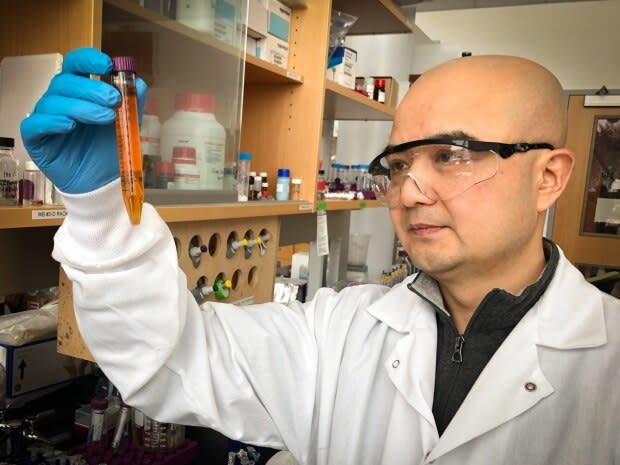CBU prof says he's developed device that cheaply cleans waste water
A Cape Breton University chemistry professor is looking for help commercializing an electrical device that uses a natural chemical to inexpensively remove pollutants from industrial waste water.
Xu Zhang said he's invented an electrical device and found a natural chemical that acts as a catalyst to rid industrial effluent of pollutants.
Zhang said the device is inexpensive and the natural catalyst makes the technology cost-effective.
He said the device can easily run on solar power or a single AA battery and can be automated and run remotely by computer.
How it works
The device works by adding the catalyst to contaminated effluent and running it past electrodes that remove the pollutants, said Zhang.
"Actually, it's more like just burning molecules, but it's very difficult, or it's very expensive, to make a device to burn some organic pollutant molecules in water," he said.
The catalyst is non-toxic and it takes itself out after the process is complete, leaving behind a salty solution that is similar to seawater, Zhang said.
The university recently issued a tender for a consultant to determine the best way to commercialize the technology.
Zhang said that could mean selling the invention to a business that would then contract it out to customers, or it could mean starting a company and licensing the technology to industrial users.
The device could be used to remove heavy metals such as arsenic or cadmium and other toxic chemicals like dioxins, pesticides or pharmaceuticals, he said.

Food processors, pharmaceutical companies and other industrial operations that produce contaminated waste water find it expensive to treat their effluent, Zhang said.
"Pharmaceutical companies, sometimes 10 per cent of their cost is essentially associated with the waste treatment," he said.
"With our cost-effective technology, I believe I can help them to reduce their cost."
Drawing inspiration from Cape Breton's past
Cape Breton's history of coal mining and steel making left behind a lot of industrial waste water, said Zhang, so it was natural to look for a solution to that problem.
"It's not just limited to just Sydney or Cape Breton, but also Nova Scotia, even Atlantic Canada," he said.
"This is a global ... issue for people wanting to get clean and safe water to drink, so therefore we believe if we can develop some cost-effective technology, it will help a lot of people."
MORE TOP STORIES

